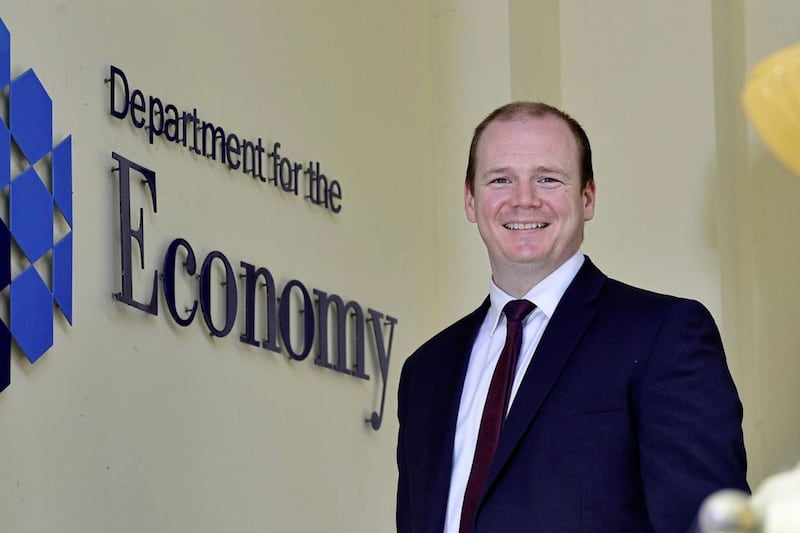A PACKAGE of economic measures designed to help steer the north out of the depths of the Covid-19 crisis will require £290 million in the first year.
Published today, the Department for the Economy’s (DfE) 29-page Economic Recovery Action Plan includes a warning that the short and medium-term outlook for Northern Ireland remains stark, with unemployment projected to rise to 6.7 per cent this year.
The plan includes a swathe of skills and apprenticeship initiatives, along with a proposal for a new artificial intelligence centre of excellence and efforts to accelerate the city and region growth deals.
But almost half the cash Economy Minister Diane Dodds will request in the next financial year will be given over to the £140m high street stimulus scheme, designed to put a £100 cash card in the pocket of every adult in the north.
A smaller £95m version of the voucher scheme was mothballed in December due to the health regulations, with DfE handing the money back to the Department of Finance.
READ MORE: Dodds happy to sell north's post-EU exit opportunities despite protocol opposition
Securing the full £140m DfE wants for the cards will depend on Executive approval and the acquiescence of Finance Minister Conor Murphy.
Ms Dodds said DfE hope to roll-out the vouchers as soon as it is practical.
“We want to have the scheme up and running at the time where we will get the optimum return,” she said.
It comes as the Executive was yesterday criticised for taking six months to convene the new High Street Task Force after first announcing the new body in August 2020.
Ms Dodds will also seek additional funding from London to expand the Project Stratum broadband project to include another 2,500 premises left out of the current scheme.
The minister described the document as “the blueprint” for rebuilding the north’s economy.
“As we move slowly back to normality, we must put all our efforts in to restarting, repairing and rebuilding our economy,” she said.
“We must encourage businesses to innovate and lead and we must support workers to prepare for new opportunities.”
Although she said the timetable for reopening the economy will be a decision for the Executive, the Economy Minister described the roll-out of the Covid-19 vaccine programme as “a game-changer”, which she said allows officials to look beyond the current restrictions and plan for recovery.
Many of the proposals in the plan relate to longer-term aspirational goals, such as developing a new Northern Ireland skills strategy and setting targets for female participation in STEM roles, but the more immediate moves could see the age cap on apprenticeships scrapped, with apprenticeships expanded for the public sector.
Another £20m is proposed for ‘building a greener economy’. In practical terms, that would involve reopening the Covid-19 energy efficient grant for businesses. There are also more aspirational goals for green innovation and an energy efficiency home retrofit scheme.
A new energy strategy is also planned for the end of 2021.
Angela McGowan, director of the CBI in Northern Ireland, welcomed the emphasis on investing in skills, creating employment opportunities and stimulating investment and demand, while Joanne Stuart of the NI Tourism Alliance, said: “The actions outlined within the report are critical to supporting the survival and rebuilding of the tourism industry.”
Invest NI boss, Kevin Holland, said the paper sets out a wider ambition to create longer term economic prosperity.
“It will contribute to the trade, investment and jobs that will support the rebalancing of our economy and underpin the building of a shared future for all. We are very happy to see innovation front and centre in driving this ambition,” he said.




